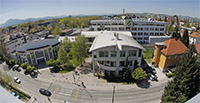Problem based learning (PBL) pedagogy aims to provide context-rich academic situations where students can work together and demonstrate authentic application of knowledge. This project seeks to address a recurrent problem in higher education related to the implementation of PBL pedagogy — that students are often disengaged from active collaboration, fertile discussion, physical interaction around emerging group artifacts, and reflection. The success of PBL implementation depends on both the selection of learning activities and development of appropriate infrastructure – that is, learning spaces in which the activities can take place. Yet, the technologies often comprising the PBL learning space in the university classroom (e.g., projector, laptops, vertical smartboard) — and the way they are being used by instructors and learners — seem to hinder the successful implementation of PBL.
This 24-month research project will join forces between two European research institutions (Cyprus University of Technology and Jožef Stefan Institute) to develop and deliver a framework comprising the construction of creative, multi-modal information spaces ideal for the implementation of PBL in the university classroom. The project is organized in three phases: In Phase 1 we will review contemporary research and practice with regards to the implementation of PBL pedagogy and the nature of information spaces in higher education internationally. In Phase 2 the construction of creative, multimodal information spaces for PBL will be achieved through iterative cycles of envisioning, prototyping, enactment, and evaluation of user experiences. We will focus on in-class explorations, in the form of design experiments, through which the information spaces for PBL will be demonstrated and evaluated in active courses. Overall, we envision PBL information spaces that will allow the convergence of various interactions and interface paradigms, made possible with the creative integration of a variety of physical and digital elements available in most university classrooms. Ultimately, our goal is to support student fertile discussion of alternative views, motivate physical interaction and collaboration around the construction of group artifacts, and encourage student post experience reflection, all of which are important aspects of professional competencies in all disciplines. In Phase 3 the project will consolidate with a framework comprising the construction of creative, multi-modal information spaces ideal for the implementation of PBL in the university classroom together with a set of implementation exemplars (concrete scenarios of co-located collaboration on PBL activities) that can be disseminated and re-used by other institutions in Slovenia and Cyprus, Europe, and worldwide. Project results will be presented in at least one scientific conference in the field of technology-enhanced learning and will be published in a scientific journal, as a joint effort between the partners.


